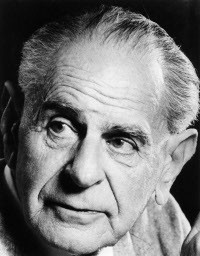Biographical and bibliographical essay
Karl Popper, an eminent philosopher and social theorist, was born in Vienna, but subsequently became a British subject. When young, Popper was intellectually precocious and had a keen interest in science, psychology, and, subsequently, philosophy ... Popper also is well known for his writings on social philosophy. His books Open Society and Its Enemies and The Poverty of Historicism, both written during the Second World War, were powerful attacks on Plato, Marx, and their arguments in favor of historical inevitability as enemies of an open society.

